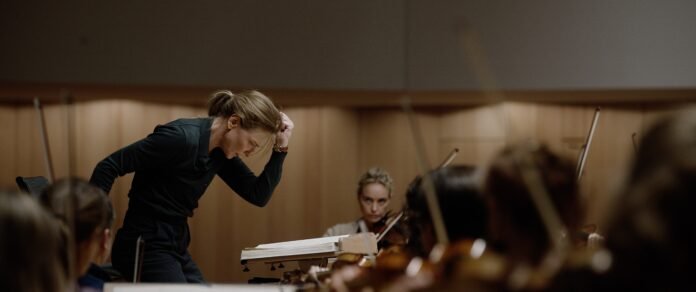Film review: Tár / Director: Todd Field / Released: 2022
Tár is a film that’s challenging to write about for many reasons, not least due to the controversy it has stirred, particularly among classical music aficionados like myself.
On the one hand, it is apparent that the director has a distinctive vision. The high level of technical proficiency and meticulous attention to detail are hard to ignore. He certainly merits recognition for creating a claustrophobic, dense atmosphere: there is a palpable undercurrent of tension in both internal and external settings (the vast, open interiors of the Philharmonie or the austere shots of Tár jogging in the park – that could well be scenes from a horror movie). Not to mention the amount of intellectual bravado involved, which feels both clever and witty. To be fair, the first 15 minutes or so, are expertly crafted, commencing with a tense interview scene that gives us an insightful glimpse into Lydia Tár’s personality.
On the other hand, as an active participant in multiple online classical music forums, I can empathise with many classical music fans who find the film irritating. So here comes the “but” and it’s a big one.
There were times I felt the boundaries of artistic license were pushed to extremes. Some notable examples: there are many overly animated conductors out there and there’s nothing wrong with that (in fact, I’m among the few who believe that a conductor’s theatricality can enhance the impact of a live performance). However, Tár’s gestures and facial expressions are simply on another level. Blanchett has repeatedly demonstrated her talent as an actress (watch her performance in Carol for an example of great contemporary acting), and her performance here is compelling. So let me clarify, my criticism isn’t aimed at Blanchet’s electrifying acting but rather at the exaggerated physical outbursts of Tár, the conductor. If one wants to justify them, one could argue that while seemingly unrealistic on one hand, they match the director’s overall aesthetic conception.
Then, we learn that Tár is the director of the Berlin Philharmonic – arguably the most prestigious orchestra in the world, not just for the quality of the music-making but also because of its historical legacy (some of the most famous conductors were at its helm: Furtwangler, Karajan, Abbado, then Rattle). So, when the orchestra has to choose a new cellist, Tár easily bypasses traditional protocols and appoints former as a soloist for the Elgar Cello Concerto, cunningly undermining the orchestra’s voting process. I just find it hard to believe that this could happen in real life, especially in the absence of backlash from orchestra members or management. I also find it hard to fathom that a conductor would instruct her assistant to carry Abbado’s photograph around with her and take it out in public to visually compare their style and posture (!) Or why Mahler’s 5th is referred to as “the big one” among the composer’s output!
But let’s focus a but on Tár’s personality – a whirlwind of extremes. One minute, she’s determined to perform the Adagietto in seven minutes, and the next, she takes pauses in the second movement that last an eternity. Again, could this possibly be a sign of her unconventional personality? One could certainly argue that. Or when she tells off a student for performing Guðnadóttir’s music and asks him why he didn’t choose the Kyrie from Bach’s B Minor Mass; a request unlikely to be musically reasonable at a college conducting workshop from a world-class conductor. But then again, with Tár, logic often goes out the window.
Anyway, as I previously stated, all of this can be considered artistic licence, but it is exaggerated. If these exaggerations are not script inconsistencies but rather reflect Tar’s emotional extremes, then I rest my case. After all, most people won’t notice the above unless they are really into classical music. Not to mention the film is fiction, so let’s pretend we’re okay with the background context – that of conducting and the world of classical music.
But even so, leaving context aside, the film has two main weaknesses for me.
First, there’s the elliptical plot. Many backstories are missing, and while I appreciate the film’s minimalist aesthetic, some of the more over-the-top scenes and acting (e.g., the school incident, the actual day of Mahler’s 5th performance) are difficult to justify. Not to mention that Crucial character development is lacking for all characters except Tár. In this respect, I agree (once more) with Richard Brody’s review for the New Yorker when he writes that “It’s also a useful illustration of the fact that there is no such thing as “the story,” no pre-existing set of events that inherently define a character’s life, rise, or fall.”
It often seems that the emphasis is on aesthetic impact rather than character development. The opening credits are a case in point, despite the fact that it is a trivial one: while the tiny fonts and geometrically precise alignment fit the film’s atmosphere, do they serve their purpose if no one can read them?
Finally, there is no denying that clichés abound. Marin Alsop, a real-life conductor who appears in the film, said she was offended, and one cannot blame her. “That feels anti-woman…To assume that women will either behave identically to men or become hysterical, crazy, insane is to perpetuate something we’ve already seen on film so many times before.” Well, let’s see. We have a female conductor who happens to be a lesbian and who happens to be emotionally unstable. It doesn’t really paint the best picture for female conductors, lesbians, or, frankly, women in general.
It’s stereotyping of that sort that ruins what could have been a great film. Perhaps it would have been if the director had kept the intellectual tone established in the first fifteen minutes. And did I mention the finale is a work of art in and of itself? Indeed, the very ending is spectacular in its conception and cinematic intensity – it is the filmmaking of a true auteur. And make no mistake, I believe Todd Field is getting there.
However, despite a strong start and finale, the main section progressively devolves into what I’d call intellectualised soap opera (too much exaggerated drama, little substance) about a deeply troubled person who also happens to be a conductor, a woman, and a lesbian. All this takes place in a cold, grey-coloured Germany. If this isn’t a parade of stereotypes, I don’t know what is.
But to end on a positive note, we have a flawed film that revolves around a single character, and although there is a lack of connecting events or history to support Tár and her erratic behaviour (she seems to have come from another planet), Cate Blanchett’s captivating presence lends it some substance.
Featured Image: https://www.focusfeatures.com/tar/gallery/







